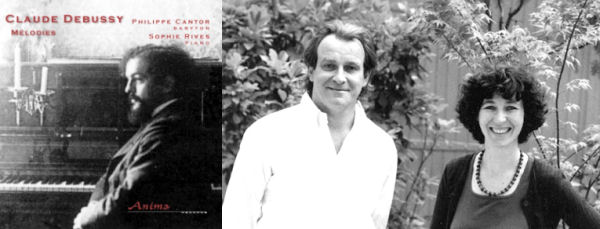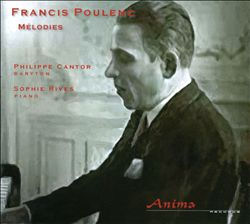Claude Debussy – Mélodies – Philippe Cantor

|
J’écoute souvent en fond sonore pendant le travail Radio Toscana Classica, station à l’excellente programmation. Je tends l’oreille parfois en entendant une interprétation frappante, comme pour Guillaume Martigné, dans la transcription de la sonate de Franck pour violoncelle : le petit papier que l’on en a fait est le plus lu de ce blog… C’est ce qui nous est arrivé récemment à l’écoute de Philippe Cantor dans Debussy ; on avait l’impression d’entendre un excellent chanteur, français, qui interprétait de la mélodie française sans les minauderies et les afféteries qui desservent souvent ce type de répertoire si difficile, depuis le temps béni des Panzéra et autres Kruysen. Voyons ce qu’il en est en comparant avec Gérard Souzay / Dalton Baldwin et Véronique Dietschy / Philippe Cassard. Fêtes galantes IEn sourdineC’est très curieux, Cantor paraît plus lent que Souzay, alors que le minutage dit l’inverse ; après avoir écouté Cantor, puis Souzay, j’ai remis le 1er : Souzay / Baldwin (enregistrés 50 ans auparavant…) m’avaient tellement impressionné par leur tenue – rythme, dynamique, expression – que j’ai cru m’être trompé dans mon jugement radiophonique : en fait non, le duo Cantor / Rives est simplement plus « atmosphérique », coloré. Ajoutons que, malgré quelques légers ports de voix, Cantor a une palette sonore plus riche, plus chaude. FantochesÉgalité, Souzay un peu plus rapide, plus dans le rythme, mais Cantor est aussi bien. Clair de luneTrès belle introduction de Sophie Rives, superbe ambiance, grande homogénéité de timbres entre le chanteur et la pianiste ; on retrouve avec Souzay / Baldwin cette tenue rythmique qui me plaît tant, mais le chanteur est un peu affecté à la fin. Le tempo plus libre de Cantor / Rives est ici plus en situation, c’est magnifique (quand même, pourquoi avoir escamoté le « t » d' »opportune » ? – Mais le problème de ce genre est que l’on ferait 10 prises, on pourrait toujours trouver un léger détail à pointer…). Ariettes oubliéesC’est l’extase langoureuseJ’ai déjà pu dire le bien que je pensais de l’album Dietschy / Cassard – Adès 1993 à propos de l’assez triste album Dessay avec le même pianiste. J’ai remis deux fois les deux, tellement on n’a pas l’impression d’entendre la même œuvre… L’enregistrement Adès est magique, même si l’on peut penser que l’ambiance éthérée est exagérée, notamment par la prise de son – ça me fait penser un peu à Voi che sapete par Frederica von Stade… Mais le duo Philippe Cantor / Sophie Rives ne démérite en rien : c’est quand même bien plus naturel. Quel talent de conteur et quelle superbe voix de mélodiste avec notamment un si beau bas-médium… J’arrête là mes comparaisons. Mentionnons aussi un superbe Chevaux de bois. Ce disque est un vrai bonheur, avec une prise de son d’une belle présence. Quel dommage que les compositeurs contemporains que l’on préfère aient délaissé le genre… Ce disque est édité par Entremuses – label Anima. L’éditeur m’a adressé un deuxième disque des mêmes interprètes consacré à Françis Poulenc. Ils y font preuve évidemment des mêmes qualités. Je relisais récemment une interview de feu Manuel Rosenthal qui rappelait que Poulenc n’accéda à une certaine notoriété qu’à la fin de sa vie avec le Dialogue des Carmélites… |
I often listen at work in background Radio Toscana Classica, a radio station with an excellent programming. I tighten the ear sometimes by hearing a striking interpretation, as for Guillaume Martigné, in the transcription of the sonata of Franck for cello: the small paper I made at that occasion is the most read of this blog… (If that can interest you, I noted what impressed me these last months: 2nd of Schubert by Kertesz/Vienna, Scriabine – Prométhée poem of fire by Mitropoulos/Vienna, the 1st of Tchaikosky by Smetacek, Stravinsky: 3 parts for quartet by the Parrenin quartet, Birtwistle: Tragedia – Melos ensemble – Lawrence Foster, Beethoven, concerto by Oistrakh/Konwinschny and a certain Filippo Maria Bressan conducting Mozart…). This what happened again recently listening Philippe Cantor in Debussy; one had impression to hear an excellent singer, French, who interpreted French melody without the mincing ways and the affects which often serve this type of so difficult repertory, since the blessed time of Panzéra and other Kruysen. Fêtes galantes IEn sourdineCuriously, Cantor appears slower than Souzay, whereas the timing says the contrary; after having listened to Cantor, then Souzay, I put 1st the first back: Souzay/Baldwin (recorded 50 years before…) had so much impressed me by their tenure – rhythm, dynamics, expression – that I believed having been mistaken in my ‘radiophonic’ judgment: in fact not, the duet Cantor / Rives is “atmospheric”, more colorful. Let us add that, in spite of some light wearing of voice, Cantor has a richerand warmer sound. FantochesEquality, Souzay is a little faster, more in the rhythm, but Cantor is as good. Clair de luneVery beautiful introduction of Sophie Rives, superb ambiance, great homogeneity of tones between the singer and the pianist; one finds with Souzay/Baldwin this rhythmic behavior which I like so much, but the singer is a little affected at the end. The freer tempo of Cantor/Rives is here more in situation, it is splendid (nevertheless, why having retracted “T” of “convenient”? – But the problem of this kind of repertoire is that one would make 10 catches, we could always find a light detail to be pointed…). Ariettes oubliéesC’est l’extase langoureuseI already told my appreciation of the Dietschy/Cassard – Adès 1993 album in connection with the rather sad Dessay album with the same pianist. I put the 2 CDs twice, so much one does not have the impression to hear same work… The Adès recording is magic, even if one can think that etherealenvironment is exaggerated, in particular by the sound recording – that makes me think a little of Voi che sapete by Frederica von Stade… But the duet Philippe Cantor/Sophie Rives is nevertheless much more natural. What a talent of storyteller and which superb voice of melodist with in particular a so beautiful low-medium… This disc is published by Entremuses– Anima label. The editor sent me a second disc by the same interpreters devoted to Francis Poulenc. They show the same qualities there I recently read again an interview of Manuel Rosenthal who recalled that Poulenc reached a certain notoriety only at the end of his life with the Dialogue des carmélites…
|

